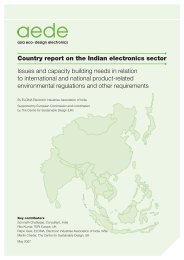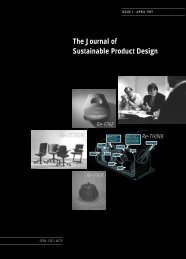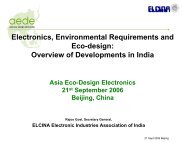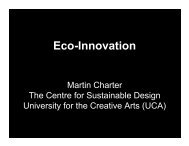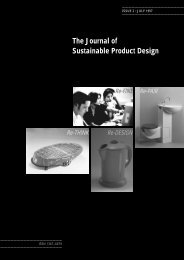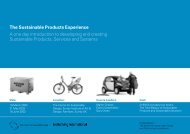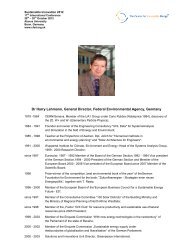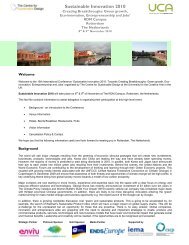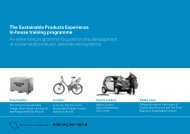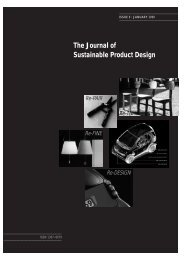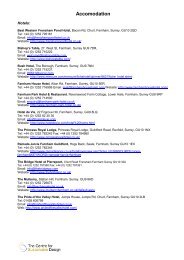Abstract - The Centre for Sustainable Design
Abstract - The Centre for Sustainable Design
Abstract - The Centre for Sustainable Design
You also want an ePaper? Increase the reach of your titles
YUMPU automatically turns print PDFs into web optimized ePapers that Google loves.
<strong>Sustainable</strong> Innovation 08<br />
Future Products, Technologies and Industries<br />
th<br />
13 International Conference<br />
<strong>The</strong> Green Transition – <strong>Design</strong>ing new metrics <strong>for</strong> sustainable<br />
development<br />
Jean-Roger Drèze<br />
Assistant director<br />
Federal Department <strong>for</strong> Environment<br />
Eurobuilding - FPS Public health and Environment<br />
Square Victor Horta 40, PB 10<br />
B- 1060 Brussels (Belgium)<br />
Phone : +32 (0)2 524 96.37<br />
Fax: +32 (0)2 524 96 04<br />
e-mail: jean-roger.dreze@health.fgov.be<br />
www.Belgium.be<br />
500 words extract describing the proposed paper<br />
Summary – Asking <strong>for</strong> radical change in governance and business models<br />
This conceptual paper focuses on new visions and thinking related to the rise of globalisation in the<br />
eve of the knowledge economy and asks <strong>for</strong> innovative metrics in the field of governance. New<br />
collaborative models should impact market structures, create new business models and promote ecoentrepreneurship.<br />
At a macro level collaborative models could introduce disruptive metrics based on<br />
sustainability principles to achieve the green transition. <strong>The</strong> paper presents big pictures and<br />
elaborates on the links between globalisation, innovation and sustainable development.<br />
Premise – Change in the scale of the economy will change the scale of risks<br />
Evidence shows that the scale of an economy (tribal, feudal, national, global) is associated to its<br />
endogenous determinants of capital accumulation and productive patterns (nature, farmland, capital,<br />
knowledge). Moving to the knowledge society will change the scale of the economy. <strong>The</strong> globalisation<br />
process can be viewed as a Transition to the knowledge society.<br />
<strong>The</strong> Transition provides global assets and benefits (Internet) but also global threats (climate change,<br />
disruptive ecological footprint, loss of biodiversity). Facing such global threats rises the question of<br />
governing the globalisation. Cumulative rebound effects will deny progress due to technological and<br />
non-technological innovation and will prevent balancing our global ecological footprint (GEF) to the<br />
global ecological capacities (GEC). <strong>The</strong> paper explores how innovative metrics based on sustainable<br />
development principles could mitigate rebound effects and achieve absolute decoupling in an age of<br />
globalisation.<br />
Our approach – Facing global threats means to adopt new strategic responses<br />
Global threats ask <strong>for</strong> absolute decoupling. One example is the “zero emission” Antarctic Polar station.<br />
However absolute decoupling is not always possible. De-materialisation and de-carbonisation of<br />
processes and products are insufficient to overcome rebound effects associated with progress in<br />
rational use of resources. Alternative solutions to absolute decoupling are to enhance global<br />
ecological capacities and responses through new collaborative models.<br />
<strong>The</strong> paper presents a Gauss Curve model to explore potential cost-benefit redistribution process<br />
between economy and environment. Switching to new cost-benefit ratio – at corporate or public level –<br />
could be possible when using sustainable development paradigm as a re-distributive and selfregulative<br />
endogenous growth model.<br />
1
<strong>Sustainable</strong> Innovation 08<br />
Future Products, Technologies and Industries<br />
th<br />
13 International Conference<br />
Our contribution - Rethinking sustainable development as a self-restrictive model<br />
Introducing disruptive metrics based on sustainable development principles could help to internalise<br />
external costs. <strong>The</strong> paper suggests that corporate governance based on the optimisation of a neoclassical<br />
production function y = f {C, L, E} could help to close the gap between the GEF and GEC.<br />
Such optimisation needs to introduce new self-regulative approaches based on renewed sustainable<br />
development metrics.<br />
<strong>Sustainable</strong> development principles, through <strong>for</strong> example eco-design and eco-conception, can change<br />
behavioural, cultural and political priorities. <strong>The</strong> role of collaborative models: revisited paradigms can<br />
provide <strong>for</strong> alternative governance models, regulating mechanisms and accounting procedures.<br />
<strong>Design</strong>ing sustainable development metrics is necessary to offer a new ‘general equilibrium model’<br />
ensuring re-distributive effects among the economic, social and environmental pillars. <strong>The</strong> wealth of<br />
nations remains in new <strong>for</strong>ms of capital and design.<br />
<strong>The</strong> paper gives examples of new market requirements addressing financial and stock exchange<br />
markets. Enterprises coping with SD will achieve better equity quotation because they regulate and<br />
fine-tune their global competitive environment, building on their competitive intelligence.<br />
2



